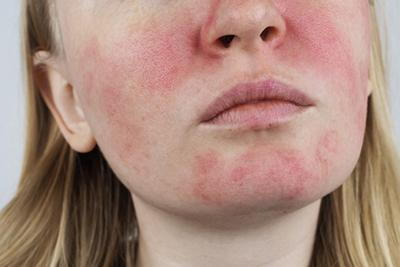Living With Rosacea

- posted: Jul. 15, 2024
Rosacea can be an embarrassing and uncomfortable condition to live with. If you or someone you love are suffering from the symptoms, visit Dr. Alpesh Desai and Dr. Tejas Desai at Heights Dermatology and Aesthetic Center with 22 locations in Texas and North Carolina for personalized treatment options.
Living With Rosacea
If you are living with rosacea, you’re not alone. It’s estimated that more than 400 million people around the world have this skin condition – and most sufferers deal with confidence issues due to the condition. Though there is no cure – and no known definitive cause – you can greatly minimize your symptoms and suffering. Dr. Alpesh, Dr. Tejas, and our team at Heights Dermatology and Aesthetic Center share how in the guide below.
Understanding Rosacea
Rosacea is a skin condition that causes redness – similar to a sunburn – that doesn’t go away. It can also cause eye irritation, bumps that look like acne, enlargement of the tissues of the nose, and more. In short, it can impact how you look and feel about yourself. You might also have uncomfortable or painful feelings, such as stinging, burning, or swelling.
Again, the precise cause of this skin condition is unknown, but it is understood that flare-ups typically occur due to specific triggers. These triggers can vary but include things such as such as:
- Drinking alcohol
- Eating certain types of foods – spicy food is a common trigger
- Stress
- Extreme temperatures
- Sun exposure
- Specific cosmetic supplies
- Some medication
Managing Rosacea
One of the most significant steps in managing and preventing flare-ups is determining and avoiding your triggers. A dermatologist can be vital in this step, as they can help identify potential issues and provide personalized recommendations, which can include steps such as:
- Changing medications
- Stress management techniques
- Changing makeup, skin, hair, or laundry products
- Wearing sunscreen
- Staying hydrated to prevent dry skin
If flare-ups occur, many people find relief by placing a cool washcloth over the irritated area or adding a gentle, fragrance-free moisturizer. Topical and oral medications are available to reduce your symptoms if necessary. Additionally, IPL or intense pulsed light therapy and laser therapy are both effective in reducing inflammation and redness.
From preventing to managing rosacea flare-ups, our team at Heights Dermatology and Aesthetic Center is here for you with 22 locations in Texas and North Carolina. Schedule an appointment with Dr. Alpesh and Dr. Tejas by calling to schedule an appointment today.
- Houston, TX: (713) 864-2659
- Houston, TX—Willowbrook: (832) 604-7400
- Rosenberg, TX: (713) 730-2000
- Lake Jackson, TX: (979) 297-6458
- Portland, TX: (361) 229-7400
- Corpus Christi, TX: (361) 994-1001
- Palacios, TX: (979) 213-4943
- Columbus, TX: (979) 213-4944
- Gonzales, TX: (830) 386-3265
- Dallas, TX: (972) 386-7546
- Mansfield, TX: (682) 518-1515
- Beaumont, TX: (409) 835-4790
- Bay City, TX: (979) 213-4943
- New Braunfels, TX: (830) 626-7902
- San Antonio, TX: (210) 942-4217
- Spring, TX: (281) 367-9110
- Wichita Falls, TX: (940) 322-9606
- Tomball, TX: (281) 617-1660
- Texas City, TX: (832) 706-3326
- Refugio, TX: (361) 288-1450
- Victoria, TX: (361) 808-4496
- Reidsville, NC: (336) 398-3819





